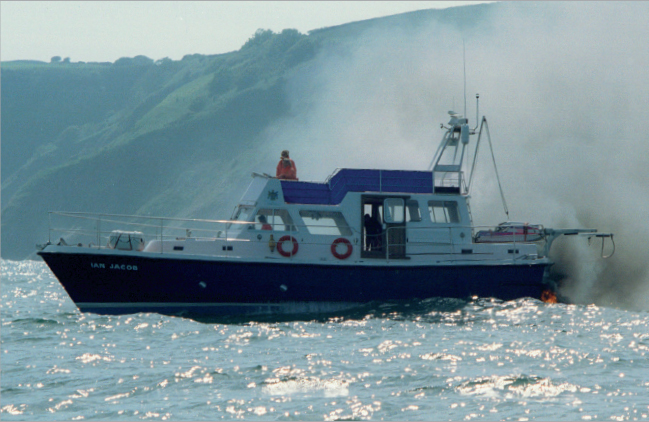Fire prevention and control
Short of sinking, there is nothing worse than a fire onboard. Not all fires are preventable, but most are, so time spent drawing up a risk assessment and installing prevention measures may not only save your boat – but lives too.
Most boat fires start in the galley, and alcohol stoves are the worst culprits. If you have one, change it for a gas-fired cooker/stove.
- Ensure that gas canisters are stored in a locker that drains outboard of the boat, and not into the bilge
- Fit a gas detection system in the bilge and replace sensors if they get wet
- Shut off gas valve near cooker after use
- Shut off gas bottle valve overnight and when boat is left unattended
- Locate a fire blanket close to galley. The best way to smother fat flames and burning clothing
- Fit Galocarbon/CO2 fire extinguishers within easy reach of both ends of the galley.
- Check for loose or corroded connections and broken strands, and replace
- Check that all circuits and retro fitted equipment like automatic bilge pumps, radios and starter motors are fused
- Install correct sized wiring rated to the input of the appliance.
- Fit an auto extinguishing system in the engine room
- Keep the engine and bilges clean and check for oil leaks each time you go afloat
- Check fuel lines for leaks and damage from rubbing or vibration
- Store reserve fuel in a locker that drains outboard of the boat, and not into the bilge
- Don’t keep oily rags onboard. Dispose of them after each trip.
- Enforce a no-smoking policy below decks
- Fit a halocarbon/CO2 fire extinguisher in each cabin
- Check fire extinguishers every 6 months
- Turn them upside down and shake them
- Weigh them. If they fall below 0.25lb (0.11kg) of stated weight, replace them.
- Lightning can cause a serious fire, but not when you provide the charge with a continuous route to ground
- Connect the mast or steel radar/instrument bar to grounding plate on bottom of the hull or keel with No 4 AWG or heavy copper cable
- Do not connect it to the engine
- Charcoal can combust spontaneously when damp. If you must take charcoal aboard, seal it in plastic bags to keep it dry.
- A fire requires air, fuel or heat. Remove one of these elements and the fire will extinguish itself
- Do not lift engine hatches
- Turn off fuel, gas and electricity
- Aim extinguishers at the base of the fire
- Splash water by hand rather than throw from a bucket
- Smother fat fires and clothing with a fire blanket
- Use the deck wash pump as a fire pump if necessary.
- If the fire burns out of control, abandon ship
- Transmit Mayday
- Don life jackets
- Fire flares
- Launch liferaft.
This powerboat suffered a port engine fire. Quick action by her crew put the fire out and they were able to return to port unassisted.
